"Donald in Mathmagic Land"
You know, in spite of the grim unavoidability (I could've said "inevitability; it's denotatively the same thing, but somehow it doesn't sound right to me) of thinking about President Dumber Azathoth, he hasn't totally colonized my brain: when I hear the name "Donald," my immediate impulse is still to say "Duck," not...that other thing. So I've got that going for me.
Okay, so for the last few months, this kind of weird thing: I've been getting emails from a woman, all very similarly phrased, instructing me to review various stories (VERY strange array, including Barks classics, stories that have never been released in English, at least one that I've already written about, and a few that I found totally unidentifiable from the given titles). I mean. It's not that I've NEVER been known to write about a story on a whim because a stranger wanted me to, but this isn't necessarily the way to win a duckblogger's heart. Its not that the emails were rude, but...well, I guess it was that a little, but moreso that I just found the presentation baffling. Also, a little creepy. She once sent four emails in a three-day span, and I'm concerned I might be about to live out the duck-comics-writer version of Misery. Still, I thought, I dunno, maybe I should reward this weird, robotic repetitiveness. What's the worst that can happen (famous last words)? One of the stories she requested at one point was this one, so, uh, I guess this is for you, Ms. MacGregor. But in all seriousness, let's be clear: this is the ONLY one. If I ever happen to cover any of the others, it'll have nothing to do with you.
So, as I suppose we all know, this is this comic-book version of an educational cartoon that you'd watch on VHS tapes on big ol' boxy TVs that the teachers would wheel in on carts when they wanted to take a breather (that's a common experience, right?). Pretty successful; much more so than their later efforts along the same lines ("Uncle Scrooge and Money," "Donald and the Wheel").
So naturally I rewatched in in preparation to dive into the comic. My review: kinda fifty-fifty. It looks great, and I like the parts that just feature Donald fucking around; I love him jamming with the Pythagorean musicians and getting harrassed by chess pieces while dressed as Alice. But I'm not a huge fan of that condescending-ass narrator, and when it's just, like, math stuff, my eyes glazed over: blah blah rectangles proportions shapes. I think math IS super-interesting, but the cartoon doesn't do a good job of conveying this. It's just a bunch of jumbled factoids. What can I DO with it? I feel like Donald getting confused about angles as he tries to make a billiards shot.
That said, though, I AM a big fan of the last part, where the narrator starts tripping balls and babbling about how shapes exist in your MIND, man, and just randomly free-associating about different shapes and inventions and who knows what all. Fun to watch. Also, fun fact: I'm writing this introduction before rereading the comic to write about it, and I have very little memory of it other than the framing device where Donald tricks Scrooge with chess math, so I'm very curious as to how this nonsense is going to translate to the page. Let's see, shall we?
Here is THIS, which proves beyond a shadow of a doubt that numbers exist. Inducks does not hazard a guess as to the artist, and it's pretty hard to suss out, given that even lousy artists rarely drew the ducks looking that squashed.
Anyway, let's get going. As in "Donald and the Wheel" and "Uncle Scrooge and Money," we get an all-new framing device to make it more like a comic than a cartoon story. It's interesting because it proves that they knew that these things were very different. The cartoon just starts with Donald stumbling into this mysterious realm, which is fine. When Elmer Fudd appears from the left of the screen with a rifle, you don't demand context. He just is! As is cartoon-Donald!
As for the device itself...boy, HERE we see Scrooge at his worst. Is this illegal? IANAL, but I doubt it. It SHOULD be, of course, but...well. My advice for Donald: stop paying. Just refuse to give him any more money under any circumstances. What's he gonna do? We don't have debtors' prisons anymore. Is he going to take legal action against his nephew, and if he can foreclose on his house and kick him out? Is he really THAT evil? You know he's not! Your logic doesn't work! I'm calling your bluff!
(I do sometimes wonder how duck comics might've developed differently if these writers (including Barks) had taken the whole "I made it square" thing more seriously.)
To cut a long story short, here's The Spirit Of Mathematics™, which is just an unheard (but quite smug and condescending) voice in the cartoon. You know he's special 'cause he gets his own font (I think it's the same one the, uh, wheel spirits use in "Donald and the Wheel"). Also, "call me shivers?" Clearly a slightly mangled version (intentionally?) of "shiver my timbers," or whatever one shivers.
Also: "Adventure is my dish, chum!" Don Christensen's writing does elevate this a bit. I like how in the top left panel, the spirit is just sort of vaguely babbling about math. Doesn't sound like he's super into this.
Anyway, welcome to Mathmagicland. I really do enjoy the surreality of the place. Also, what if Chip and Dale were groundhogs? I guess more like prairie dogs, actually? Either way.
I'm trying to remember why I cut these panels, and it seems like it was probably just because I like "the whole routine is strictly for squares." I also like the shape-creatures. Hey, did you know (of course you didn't) that back in elementary school, my friend and I would entertain ourselves by drawing pictures of "Math Mutants vs Ninjas?" Math mutants were just numbers with angry faces and fangs and sometimes swords and things. I might actually still have my old notebook with them in it in the attic, and maybe when it's less of an inferno up there I'll go check and if so scan them.
Okay, that's just a silly and funny joke that I like a lot.
Donald also turned into a caveduck in "Donald and the Wheel." It's not really surprising, given that these were both created by the same artistic teams. I think the problem here is less one of math...
...and more of the Inherent Savagery of caveducks. Maybe the idea is that math will have a civilizing influence on them? Hmm. Seems unlikely that there actually IS any idea.
In fairness to the story, I DID learn one thing: I had no idea about this Ancient Egyptian numbering system, probably because, unlike Roman numerals, it doesn't have any modern-day significance. The interest is purely historical. It IS interesting, though! We can't imagine living in a world like this: if I lived in a culture with a lame numbering system, I'd just whip up a better one! you might think. But you wouldn't, because you're dumber than you think you are. As am I.
Also--Pan Milus is going to enjoy this, because I'm about to reference a Polish thing--it makes me think of a part in Boleslaw Prus' novel Pharaoh where there's a super-learned Egyptian priest, and the narrative is clear how erudite and brilliant he is, and then shows him using really crude, laborious methods to solve a fairly simple math problem. Now that I know that that's based on actual math of the time, I get the joke. That's fun.
And here we have a pretty-good description of Roman numerals--although it does seem to suggest that you can just use the same character unlimited times, whereas in actuality, you just couldn't write numbers after a certain point (and that point is MMMCMXCIX, 3999), unless you were using those lines over them. Also, the story really should point out that their main use today is for movie release years.
The story goes on for a while about geometry, but possibly only to distract us from algebra, which is name-checked but never mentioned again. The story doesn't even say what it is. I do think there's some educational value to this, but...maybe not as much as would have been wished. It really is kind of a miscellany, presenting mathematical and/or historical fact x and caroming on to something new. It's kind of fun, sometimes, but it's so unsystematic it seems like it would give people a very fragmented view of these things.
But what the hell, if Donald's futzing around, I'm good (you'll recall that that was my feeling about the cartoon as well). Sittin' on a girder, spittin' something akin to knowledge--all is well with the world.
Why did I stick this here? Probably just to cover trigonometry. What an eccentric thing to do. Have I mentioned here--I frequently find myself mentioning this, somehow--that the main thing I remember from high school trig is the mnemonic device "Some Old Horse Caught A Horse Taking Oats Away?" Well, it is. That should be the premise for a major motion picture. Also, digging these Operation Paperclip dudes. And "Man! These triangles sure keep busy!"
Anyway, we've gotta awkwardly segue to the music stuff, because that's one of the best parts of the cartoon. "Strictly from Square-Land" is just about perfect.
Naturally, the jam session doesn't have quite the same impact in panel form, but hey, nice try.
However, it IS fun that these guys show up. Why not?
And I DO like these "educational" panels. Why do I like them not not the lecturing in the video? Pretty sure it's a purely aesthetic preference. But the story presents them well, dammit.
Spirals! Quadrants! Hexagons! Fuckin' bees murdering you for no reason! How can you not be into this?
And then, there's this. That's a real woman in the cartoon. And does her sash confusingly say "Miss Cookie Week?" It sure seems to.
I almost don't want to go down this rabbit hole, but I suppose in the name of completeness I should show what the Gladstone remake turned her into:
I suppose you have to give them a little credit for adding that "perfect ice cream soda" stuff so it's a li'l more mathy than the original. I don't think this was changed because anyone thought the depiction of the woman per se is sexist; I'm pretty sure it's because they found Sweet-Tooth-Donald more acceptable than Horndog-Donald. I mean; I dunno. I don't care much, but are we THAT terrified about it being vaguely suggested to our children that comic-book characters may experience concupiscence? I dunno; this story depicts Donald in a specific way based on the specific time and place it was written. Taking bits of that context out harms your ability to understand the story. Not that you necessarily should NEVER edit the worst offensive content, but this seems pretty anodyne.
Gotta have circles, and it's funny that Donald can't imagine one, something that is super-easy to do. I do sorta wonder: did they get, like, some sort of mathematical consultant for this story, to make sure they're not spouting gibberish? Or for the cartoon, though they're different enough that you'd need one for each. But really, you are NOT going to convince me that this is based on Christensen's personal knowledge of math.
(Actually, now that I look I see that one of the people credited for "story" in the cartoon is Heinz Haber, another Operation Paperclip guy, so clearly at least the cartoon-people did their due diligence. I really hoped that Haber would turn out to be one of the scientists depicted in that part about triangles--would've been a cute touch--but no; those guys both have mustaches, whereas Haber is clean-shaven in every photo on the internet.)
But THIS, here, is the one part of the story that I simply do. not. get. Gears? What in the world are you TALKING about? Are gears known for being thicker on one end than the other? And for not having any kind of teeth or anything? If you know what Christensen is on about here, please tell me.
Now we get to REALLY trip out. Great fun. A clumsy metaphor, and more or less ideologically offensive, but I can't help loving the rocket shooting out of the door like that.
Of course we've gotta have the billiards thing, though the comic seems less interested in it than the cartoon. But mainly, I just want to ask: you wish your lawn would look like a pool table? Completely flat and uniform? Seems less than appealing, but you do you. I guess.
Fun...with arithmetic? Such signs and wonders shall never more be seen on Earth! I dunno; I like the nephews accidentally wishing themselves out of existence. Not sure if any of the tricks we're seeing here are "amazing" or not, though.
Trick that require the trickee to do a bunch of mental math are BAD, I tell you. It just makes the fact that something tricky is going on too obvious. Besides, I'm here to be amazed; not to fuck around with numbers. Aren't YOU the mathemagician?
Anyway, back to the framing narrative.
I don't think Christensen quite thought through the implications of Scrooge having a chessboard just sitting there. I find the question of Scrooge's chess habits more interesting than anything else in the story.
Yeah, so I'm pretty sure everyone knows how this is gonna go. Considering that he was doing all that compound-interest stuff at the beginning, you'd think Scrooge would be too. But maybe that was all just obfuscatory bullshit designed to trick Donald into staying in debt forever. Wouldn't put it past this version of the character, though pragmatically, I don't know how he thinks he's going to rent them a house when Donald can only afford to pay tiny fractions of his fifteen-dollar debt.
Okay, even if he doesn't quite get it at first, you'd think by the time we got to forty dollars he'd see which way the wind was blowing. But evidently not.
Considering what a dick Scrooge is here, I think Donald would be within his rights to skim a LITTLE money off him. Or at least make a binding agreement that all future loans will be interest-free. Seems fair. Also, is "Complete Mathematics" really meant to include EVERY little math-related...thingie? And come on, if it's even close to complete, there's gotta be SOMETHING in there about exponential growth.
...heh...
So what have we learned here? Not as much as you'd hope for from a putatively "educational" story, really. I'd say we learn more from a classic Barks adventure story any day.
Anyway, time for bonus bullshit.
Yup...that's the trick from the story, though in the story you're meant to add 8. As I say: bad trick. I don't think it'll impress anyone. It certainly shouldn't.
But here's something you'll REALLY like!
...okay, I lied. But at least it's different. Worse, maybe, but definitely different. But goddamn, just LOOK at that bottom right panel. I'm supposed to just remember all that bullshit? Get outta here!
Maybe you can make it sound almost right, but we are not shown an example of that. This one'll REALLY irritate your friends!
JEEZ, this too? Okay, here it is. Sure, pyramids are math. Not sure how much mathmagic there is, though.
Okay! We are done here.
Labels: Don Christensen, Tony Strobl






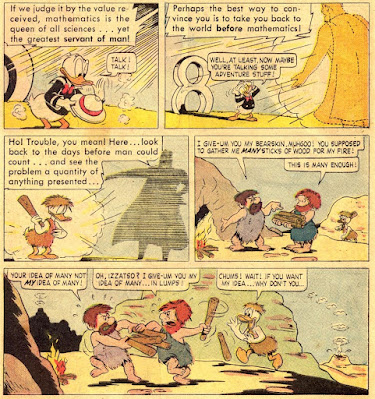

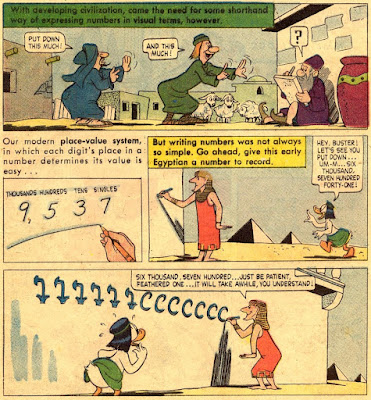











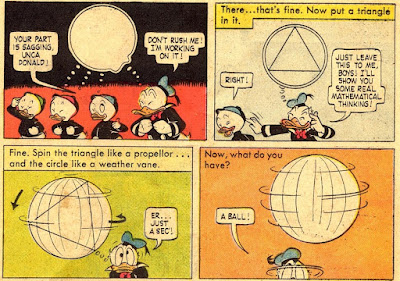



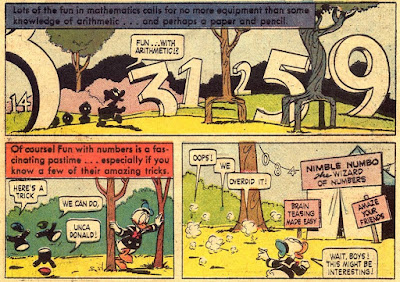







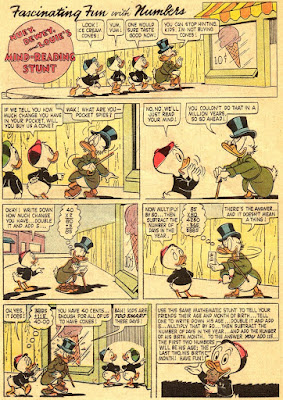




10 Comments:
Perhaps in the name of completeness you should show what the Gladstone remake turned her into? I believe you forgot to include that pic.
I wait with bated breath to see whether any of your readers can explain how we got from sliced cones to gears!
Dangit, I always get SOMETHING wrong! Curse this human fallibility!
One of the purposes of gears is to transfer rotational movement from one axis to a different axis. To do this, you need gears that grip at an angle, and for that you use conic sections (with teeth, usually, but that's not the important part here).
That's an interesting fact (I mean, I assume it's a fact--an anonymous person said it on the internet; what more do you need?), though I suspect that as far as gear-comprehension goes, more people are in my camp than yours.
Lovely review as ever!
I do think this story deserves a lot of credit for the font gimmick! Not very common in comics at the time, such shenanigans, and it partakes of the general visual creativity on display.
“(I do sometimes wonder how duck comics might've developed differently if these writers (including Barks) had taken the whole "I made it square" thing more seriously.)”:
Much as a lot of stories overdo it, I think that might have been a poisoned chalice, really. We get enough uncomfortably bootlicky fawning over Scrooge the Perfect Self-Made Tycoon as it is (*looks at Don Rosa*) without an even more prevalent legacy of emphasising what a moral paragon he is.
It amuses me more than it should that one of the two cavemen is called Muhgoo: his proportions and bulbous nose resemble Mr Magoo's plausibly enough that it's very possible to imagine Donald has bumped into another one of those "identical ancestors of a modern-day iconic character" types, only from the wrong franchise altogether.
It may amuse you to learn that the "thirteen times seven" joke is plagiarised from a fairly notorious Abbott & Costello sketch. https://www.youtube.com/watch?v=A_xLOMdGWsU Pretty desperate way to make up the page-count in a purportedly educational book, if you ask me.
Yaaay! My shallow, lonely existence is acknowledged!
Maybe due to my dyscalculia (yes, I actually have a diagnosis), I was never into math (yet I love reading about astrophysics, go figure), but I still find a lot of the trivia presented in stuff like this interesting and making me want to research more.
For a long time, I assumed it was a made-for-TV short, and I was impressed by its animation quality (much better than, say, Uncle Scrooge and Money) but I was happy to learn that it actually had a theatrical release. The "Alice" segment felt like it could’ve been an unused concept for the Disney movie (especially since it already borrows a lot from "Through the Looking Glass"). In fact, I’m almost sure that some later Disney Alice material reused the image of the Red Queen taken from Mathmagic Land as if she was from actual Alice movie. It’s almost odd that this never became a special feature on any of the many, many Alice DVDs, it feels like an obvious choice next to the "Through the Looking Glass" Mickey Mouse short.
I recall years ago some internet grifters making a big deal out of Donald having a pentagram on his hand ("Oh, no! Satanic messages in Disney cartoons!" etc.), I wonder if that was in the comics as well or if they removed it.
The addition of Scrooge here is interesting, but if they’d had Ludwig Von Drake, it would’ve felt even more natural. In fact, if I understand correctly, the TV antology show that featured this short was also Von Drake’s debut. Wonder if he was somehow edited into this - again, feels natural.
Finally, I can't imagine they didn’t have consultants for the cartoon, especially since it was considered a "documentary." I don't think any studio would just put money into animation like this and go "I have a good huch we know what we are talking about". Even "Fantasia" had science consultants for the dinosaur segment. In the comics case it felt like at very least they where suply with research/educational material which they fleshout to form their story.
As for Donald being horny for women, it feels like a trait from the cartoons (especially The Three Caballeros) that's harder to include in the comics, since it quickly raises questions about Daisy. It's easier to ignore their relationship in individual shorts, though - even Rosa addressed this.
"Much as a lot of stories overdo it, I think that might have been a poisoned chalice, really. We get enough uncomfortably bootlicky fawning over Scrooge the Perfect Self-Made Tycoon as it is (*looks at Don Rosa*) without an even more prevalent legacy of emphasising what a moral paragon he is."
That's a good point. It is kind of funny how portrayals lurch back and forth between Martina-esque sadism and Rosa-esque worshipfulness (of course, Rosa ALSO has a sadistic streak, making it even weirder). I suppose an argument can be made that even if you don't LIKE a particular portrayal of the character, it DOES create a certain dynamism.
I believe cartoon and comic JUST pre-date Ludwig. But you're right; it would've been a more natural choice than Scrooge.
Oddly, this comic won something called a Maggie Award back in 1959.
https://archive.org/details/sim_advertising-age_advertising-age_1959-11-30_30_48/page/28/mode/2up?q=%22donald+in+math%22
Post a Comment
Subscribe to Post Comments [Atom]
<< Home